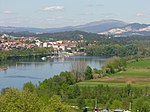The Minho ( MEEN-yoo, Portuguese: [ˈmiɲu]) or Miño ( MEEN-yoh, Spanish: [ˈmiɲo], Galician: [ˈmiɲʊ]; Proto-Celtic: *Miniu) is the longest river in Galicia, with a length of 340 kilometres (210 mi). It forms part of the international border between Spain and Portugal. By discharge volume, it is the fourth largest river of the Iberian peninsula after the Douro, Ebro, and Tagus rivers.
The Minho waters vineyards and farmland and is used to produce hydroelectric power. It also delineates a section of the Spanish–Portuguese border. In ancient English maps, it appears as Minno.The source of the Minho lies north of Lugo in Galicia, in a place called Pedregal de Irimia. After about 73 kilometres (45 mi), the river passes just south of the walls of this old Roman city, discharging in average 42 m3/s, and flows south through canyons until the valley widens north of Ourense. The river has been harnessed in reservoirs from Portomarín to Frieira. Along its length, it has the following reservoirs: Belesar with 654 cubic hectometres (530,000 acre⋅ft), Peares with 182 cubic hectometres (148,000 acre⋅ft), Velle with 17 cubic hectometres (14,000 acre⋅ft), Castrelo with 60 cubic hectometres (49,000 acre⋅ft) and Frieira with 44 cubic hectometres (36,000 acre⋅ft).
About 20 kilometres (12 mi) north of Ourense at Os Peares, the Minho, with a discharge of 102 m3/s, receives the waters of its main tributary, the Sil, with 184 m3/s. Passing Ourense, there is one major dam at Frieira near the town of Ribadavia, which is famous for its Ribeiro DOP wine (called after the name of the region). There, the Minho averages 316 m3/s of discharge. Later on, the river flows in a southwest direction until reaching the Portuguese border near Melgaço.
After 260 kilometres (160 mi) through Galicia, the Minho sets the border to Portugal for about other 80 kilometres (50 mi), mainly towards the west. The valley is a lush, green agricultural area where the land is used to produce corn, potatoes, cabbage, even kiwi fruit, or just grass, depending on the time of year, and everywhere edging the fields, rivers and gardens, wherever there is space, the vines which produce the light, slightly sparkling "Vinho Verde" and the Ribeiro wine, both peculiar to this area. The very best of these wines, Alvarinho in Portuguese or Albariño in Spanish and Galician, is produced in the area around Monção, Arbo, and Melgaço.
Passing the medieval towns of Melgaço and Monção, the Minho divides the Spanish Tui and Portuguese Valença do Minho, towns that guarded an important bridge for road and rail. Both towns preserve fortifications and are national monuments. The Minho reaches the Atlantic between the Galician A Guarda and the Portuguese Caminha, with an average discharge of 420 m3/s.










